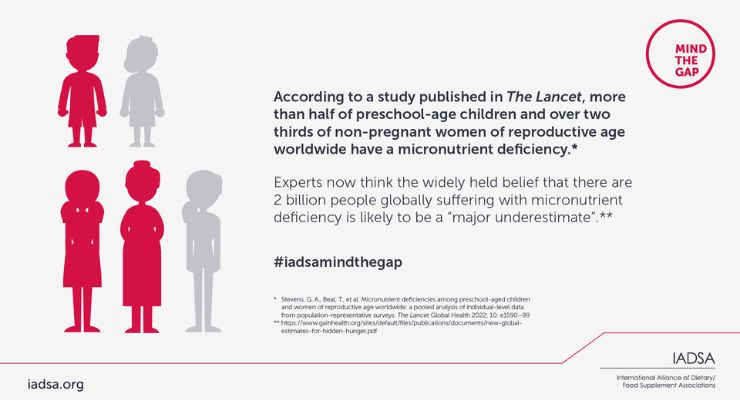Market Updates
Micronutrient Deficiencies ‘More Widespread Than Originally Feared’
IADSA has developed a new resource highlighting the findings of a new study on global malnutrition and explores how to address the issues raised.

By: Sean Moloughney

More than half of preschool-age children and over two thirds of non-pregnant women of reproductive age worldwide have a micronutrient deficiency, according to a scientific review published in The Lancet.
IADSA, the International Alliance of Dietary/Food Supplement Associations, has developed a new Mind the Gap resource highlighting the study’s findings which expose the true extent of global malnutrition.
Titled “Wake-up Call: Experts sound the alarm over micronutrient deficiencies” IADSA’s new resource explains the key conclusions from the study and explores how best to address the issues raised.
The researchers looked at data for deficiencies in iron, zinc, and vitamin A in preschool-age children, and iron, zinc, and folate in non-pregnant women of reproductive age. The burden of deficiency in at least one micronutrient was 56% for children and 69% for women. Levels of malnutrition were at their worst in the developing world but were also widespread in high-income countries.
The researchers focused on preschool-age children and women of reproductive age for their analysis because there is enough global data for these population groups. Insufficient data exists for other groups, including school-aged children, adolescent boys, men, pregnant women, and older adults.
The review was led by the Global Alliance for Improved Nutrition (GAIN) and the Micronutrient Forum (MNF). Following publication, GAIN and MNF said there was now an “urgent” need for action. They also said these findings suggested the widely held belief that there are 2 billion people globally suffering with a micronutrient deficiency is likely to be a “major underestimate.”
Among measures identified by GAIN and MNF to address the problem were fortification of food with vitamins and minerals, and supplementation programs targeting pregnant women and young children.
“The significance of this review cannot be overstated,” said Cynthia Rousselot, IADSA’s director of technical & regulatory affairs. “It indicates that micronutrient deficiencies are more widespread than we originally feared. Malnutrition can result in health and developmental problems and reduced educational outcomes. It is up to all of us to find ways to address this hidden hunger, including better integration of supplement programs into nutrition and health policy.”




















